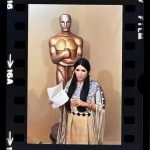Rebecca Nagle has turned the false history of Native American communities she received as a child into a career of truth-driven storytelling.
A writer, journalist and author, Nagle is the host of the documentary podcast “This Land” and author of the novel “By the Fire We Carry.”
Born in Joplin, Missouri, 38-year-old Nagle spent much of her youth in Tulsa, Oklahoma, and Oklahoma City with her Cherokee family members. She recalls Native history scarcely being addressed throughout her education.
“I remember making ships out of popsicle sticks to celebrate Columbus Day and asking questions that went unanswered. I definitely think my education was lacking when it came to that stuff in public school,” she said.
Her understanding of her family history and culture was primarily taught through her grandmother.
“Growing up, I learned a lot from my grandma. She made sure that we understood that we knew who our family was,” she said. “And then, of course, as an adult you sort of test what your family members told you about your family.”
Her family’s portrayal of their forebears was mostly heroic, focused on how her “Cherokee ancestors sacrificed their lives for the sake of the Cherokee Nation.” Though she recognizes that her family’s history has more detail and nuance, she has kept their overarching pride and sacrifice close to her.
This passion for history fuels much of Nagle’s work as a writer and journalist. Over its two seasons, her podcast, “This Land,” reflects her will to dive into research and highlight the very stories that were avoided throughout her childhood.
The first season leads the audience through the case of Patrick Murphy, a citizen of the Muscogee Nation who was sentenced to death for the murder of George Jacobs in 1999. Murphy’s case took an unexpected turn when his attorney challenged his conviction by arguing that he could not be prosecuted by the state of Oklahoma but instead must be tried by the Muscogee Nation. Murphy was ultimately convicted for murder and sentenced to life in prison by the federal court.
Season two continues the work of purposeful storytelling by detailing the Haaland v. Brackeen Supreme Court case, which challenged the constitutionality of the Indian Child Welfare Act’s restrictions on Native children being adopted by non-Native parents. The high court affirmed the constitutionality of the act in 2023.
Nagle describes the work she produced on her podcast as a push that led her to writing her novel, “By the Fire We Carry.”
“We made the first season, and I then kept wanting to follow this story and follow those threads, and I felt like I had more to tell and more research to do,” she said.
“By the Fire We Carry” invites readers through the fight for rightful ownership of Native lands. Deep diving into U.S. history, Nagle highlights the ways in which Native people were forcibly removed from their homes on lands that are now recognized as property of eastern Oklahoma. The history she details provides context to the Murphy case, which she recognizes as a modern-day portrayal of the generations-long battle for Native grounds.
Exploring how the past has influenced the present and using that knowledge to increase visibility and awareness is a primary reason she has continued to amplify Native stories in her journalism career.
“When you look out in the news media, there just isn’t enough Native representation, and I think that that creates this prevailing ignorance in U.S. society about Native people and our tribes and the law,” Nagle said.
“That ignorance is a really big barrier for progress, and I think that impedes us having better policy in place. That’s one thing that I’m very passionate about: pushing back against that erasure and having Native stories in the mainstream,” she continued.
But she said it can be tricky to get editors to view these stories as newsworthy.
“It’s almost like if you were writing about women’s reproductive health and your editor didn’t know what abortion was and that’s their starting point,” she said.
“People who are used to having a [high] level of knowledge and expertise have a hard time when they’re confronted with this situation where their ignorance is kind of daunting. I think some people can have a hard time admitting that.”
Today, Nagle can be found working on an essay series with other Native writers and historians about the history of colonization and genocide against Indigenous people undermining democracy in the United States.
“You can tell some big lies about tribes and about Native people, and people will believe it because they don’t know that much. I think when you look at history, I can tie every oppressive policy against Native people to the lies that were told to justify it,” Nagle said. “I think so much of history informs our present day and I think we can’t understand one without the other.”






